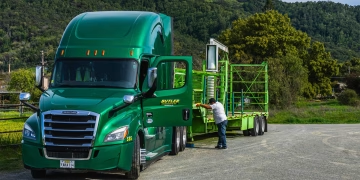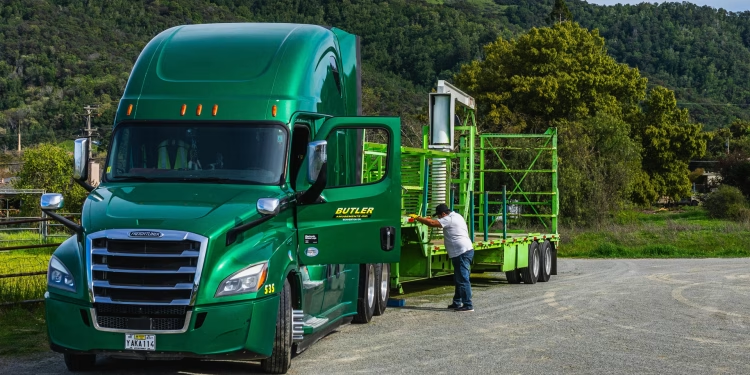By Eva Richardson | The Logistic News
April 11, 2025
India’s freight and logistics sector is on the brink of a massive transformation, as GreenLine Mobility Solutions, an Essar Group venture, announces a landmark $275 million investment to lead the country’s transition to low-emission heavy trucking. The move marks one of the most ambitious private sector-led decarbonization initiatives in Indian logistics to date.
The investment—bolstered by a $20 million backing from Indian entrepreneur Nikhil Kamath—will fund the deployment of more than 10,000 LNG and electric trucks, along with the construction of a nationwide clean-fuel infrastructure designed to challenge the diesel-dominant transport model.
Decarbonizing One of India’s Most Polluting Sectors
Heavy-duty trucking is one of India’s largest emitters of greenhouse gases, responsible for nearly 15% of the country’s carbon emissions. GreenLine’s strategy targets this critical pain point by offering zero- and low-emission alternatives without compromising on cost or performance.
“Our objective is bold but necessary,” said Anshuman Ruia, Director at Essar. “We are building a green logistics ecosystem from the ground up—trucks, refueling infrastructure, energy sourcing, and client transition planning. This is how India leapfrogs to sustainable logistics at scale.”
Building the Backbone: 100 Refueling and Charging Stations
To support this fleet transformation, GreenLine will also build a network of 100 stations across India, offering LNG refueling, EV charging, and battery swapping. This infrastructure will not only serve GreenLine’s fleet but potentially become a cornerstone of India’s broader green transport ambitions.
According to company estimates, the new fleet and fuel network could eliminate 1 million tonnes of CO₂ annually, a meaningful contribution toward India’s Paris Agreement targets and the country’s commitment to net-zero by 2070.
A Track Record That’s Already Delivering Results
Even before this latest funding round, GreenLine had quietly been proving its model. Its fleet of over 650 LNG-powered trucks has already covered more than 38 million kilometers, delivering cargo for clients across FMCG, e-commerce, mining, cement, oil and gas, and other critical sectors.
The company reports that its trucks have helped reduce 10,000 tonnes of carbon emissions and have achieved operational parity with diesel-based systems in terms of both cost and efficiency.
“Our customers aren’t choosing green trucking because it’s trendy,” said Amit Bapna, CFO at GreenLine. “They’re choosing it because we’re offering a clean alternative at the same price as diesel. We’ve removed the green premium, and that’s where the real disruption lies.”
An Investment with National Impact
For investor Nikhil Kamath, co-founder of Zerodha and a prominent sustainability advocate, the decision to back GreenLine was both economic and philosophical.
“India can’t meet its climate goals unless we decarbonize freight—and that won’t happen without scalable private-sector innovation,” Kamath said. “This investment isn’t just about trucks. It’s about building the backbone for clean commerce.”
Industry observers see GreenLine’s move as a pivotal moment in Indian logistics, where sustainability and scale are no longer at odds. If successful, it may inspire a wave of similar investments across Southeast Asia and beyond.
Why It Matters:
GreenLine’s $275 million bet on clean trucking could rewrite the future of freight in India—where speed, scale, and sustainability are no longer mutually exclusive. This is what logistics leadership looks like in a climate-constrained world.
Eva Richardson is a senior correspondent for The Logistic News, covering sustainability, innovation, and infrastructure investment across global supply chains.






















